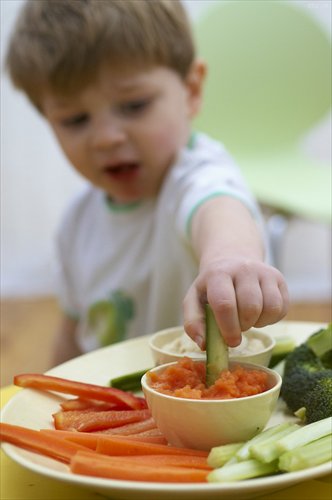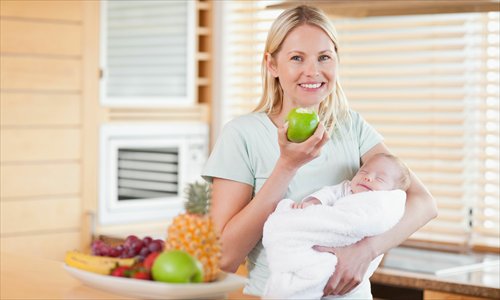Cabbage-patch kids

Raising children as vegans or vegetarians is a controversial parenting practice, even though both diets are more mainstream than in the past. Photo: IC
Chen Xi is proud of his 16-month-old daughter Liting, an obedient, mild-mannered infant with a fair complexion. Chen, 32, attributes his daughter's behavior and appearance to her vegetarian diet that includes fruit purees, vegetable juices and a diverse variety of organic foods.
"My father is an experienced practitioner of traditional Chinese medicine (TCM), so he insists on TCM-influenced recipes for each of Liting's meals," Chen explained. "He worries meat might make her vulnerable to cardiovascular diseases in future. His priority is to give Liting the healthiest start to life."
During pregnancy, Liting's mother, Su Lu, was also careful about nutrition. "Besides eating eggs and drinking milk, she followed a strict vegan diet," recalled Chen, an accountant. "Even though she craved meat from time to time, she obeyed my father's instructions and gave birth to Liting, who weighed 3.7 kilograms, in February last year."
The only problem that bothers Chen's father is that his granddaughter has developed a "salty tooth."
"She dislikes congee on its own. Salted vegetables or pickles must be added for her to eat it," laughed Chen. "Of course, my father opposes it because he worries there might be too many artificial flavors."
Health consideration
More than 50 million Chinese are vegans or vegetarians for animal welfare or religious reasons, The Times of India reported in February.
For Chen and his family, being vegetarian is strictly about the health benefits. Their choice to raise Liting as a vegetarian is also based on the fact they fear she cannot properly chew or digest meat. Both parents believe that raising Liting as a vegetarian will help her to develop a higher IQ. Fruits, grains, nuts and vegetables are all rich in alkaline, which neutralizes acid and can boost the body's immune system.
By contrast, meat and fish are acidic foods that Chen fears can be harmful in the long term. "Influenced by my father, we know eating meat and fish can cause higher rates of certain illnesses," he said.
One of the biggest criticisms leveled at parents who raise children on meat-free diets is that they put them at risk of malnutrition due to a perceived lower intake of iron, zinc, protein and other nutrients necessary for mental and physical development. Chen acknowledged this is a concern for him and his wife. Their solution has been to allow Liting's grandparents to devise a special diet that meets her nutritional requirements.
"Both of my parents are retired, so they are in charge of cooking meals," Chen said. "They specifically prepare edible seaweed and algae for protein. They sometimes add egg yolks to her meals to keep a balanced diet."
Su stopped breast-feeding Liting when she was six months old, putting her on to a diet of grains, flour noodles and fruit juice. Liting was also given teething potato strips when her teeth began coming through.
"We read recipe books, such as Raising Vegetarian Children: A Guide to Good Health and Family Harmony," said Su, who met Chen in Auckland, New Zealand, a decade ago when both were university students. "To ensure our baby's health, we've tried our best to provide a diverse vegetarian diet."
Asked how he and Su would react if their daughter one day develops a taste for meat, Chen said they would respect her decision. "I've thought of the possibility. At least we will have given her a healthy eating habit from a young age and provided her with a strong immune system."
Matthew Stuttard stopped eating red meat when he was 13 because he didn't like it, but hasn't sought to raise his 1-year-old son Louie on a meat-free diet.
"My wife is not a vegetarian. Louie can choose what he wants to do; when he is old enough to understand the choice, we will explain. If my wife was vegetarian, maybe we would raise him as vegetarian," said Stuttard, who is from Britain.
Stuttard added he sometimes feeds Louie vegetarian food to ensure he has a diverse diet. "He doesn't eat meat every day. He likes tofu and some other soya 'meat-style' products. He also likes cheese, eggs and nuts. I cook him vegetarian food. So far, I don't think he realizes which is which, he likes both vegan and meat food," he added.
Stuttard believes a lot of the world's economic, hunger and environmental issues would be solved if everybody was vegetarian or at least cut down their meat and fish consumption. Even though Stuttard and his wife are raising Louie with meat in moderation, he said that a vegetarian diet is "very healthy if it's done right."


Vegan and vegetarian parents argue that for every nutrient found in an omnivore's diet, there is a plant-based equivalent. But nutritionists say meat is a rich source of micronutrients essential for early childhood development. Photos: IC
Raising a vegan baby
As Buddhists, Zhang Lei and her husband were already vegans before they married in 2013. Zhang is so pious that she doesn't eat eggs, leeks, onions or other food that might "cause bodily odors."
"Humans are born to be vegetarians - nature can feed us. There's no need for us to kill other animals to eat. We respect other species' right to live," said Zhang, who has an 8-month-old daughter Liangliang (pseudonym).
Zhang, 28, claimed that her strict vegan diet didn't cause her to feel uncomfortable or jeopardize her daughter's health during pregnancy. She didn't suffer from anemia, a condition often linked to vegans characterized by a drop in red-blood cell, and didn't take any nutritional supplements. "A lot of people misunderstand vegans by assuming they lack certain vitamins because of their diet," she said. "I've never had this problem. I've been a vegan since 2005 and always feel energetic."
Zhang breast-feeds Liangliang, but that is the only milk she receives. Like her parents, the infant is also a vegan. "She doesn't cry at night. I enjoy sound sleep each night since she was born. She has no eczema and never gets sick," Zhang said, describing Liangliang as "clever and easier than other babies to bring up."
Raising Liangliang as a vegan was a natural choice for Zhang and her husband, but the idea was met with resistance from both spouses' parents.
"We didn't argue with them. Instead, I just showed them the outcome of our physical examinations to prove that we are all very healthy," Zhang said.
"I have always been able to produce enough milk to breast-feed, so I expect they will gradually accept our eating habit," added Zhang, who with her daughter and husband predominantly eat congee, vegetables, beans, fruits and nuts.
Nutritional concerns
Yang Hongxia, a nutritionist with the Beijing Dietetic Association, suggests parents feed their babies a rich variety of foods without restricting them to a meat-rich or vegan diet.
"Meat contains rich micronutrients, such as zinc, calcium and iron, which are harder to meet daily intake needs on a vegan diet," she said.
"Infants under 3 need sufficient nutrition from different kinds of food because their brains develop quickly during this period."
Although vegans like Zhang believes that there is sufficient levels of protein and valuable micronutrients in vegan food, Yang said the benefits of eating meat shouldn't be ignored. "Protein in meat is much easier for babies to absorb, and amino acids are also rich in meat," she said, referring to the latter as organic compounds found in living cells that join together to form proteins.
If parents insist on a vegan diet for their babies, Yang persuades them to make concessions for dairy products and eggs because both have "unsaturated fatty acids."
"Babies have higher nutritional needs for physical growth," she explained. "When they grow up, they can choose whether veganism or vegetarianism is for them. In any case, I have found that vegan babies often grow up partial to a particular kind of food that isn't always healthy."
Newspaper headline: Parents of vegan and vegetarian babies hail benefits, but nutritionists still unconvinced